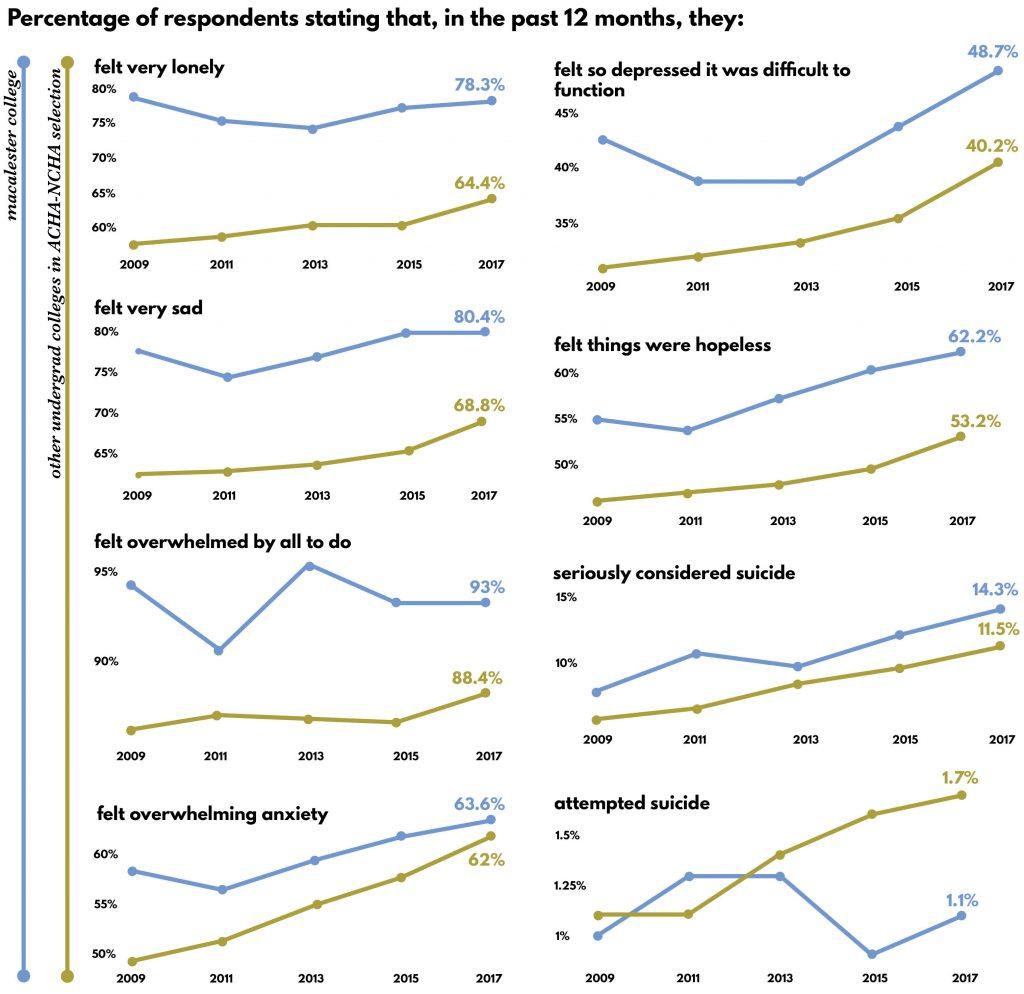Mental health numbers in context: Macalester and peer colleges
April 3, 2018
Content Warning: Matias Sosa-Wheelock’s death affected all members of the campus community differently, depending on individual experiences that night, in the days following or with mental health and mental healthcare at other points in their lives. This special report includes in-depth reporting on the response to Sosa-Wheelock’s death as well as the state of mental health and healthcare on campus more broadly. While we have refrained from including graphic details, it may nonetheless be difficult to read. Before beginning, please be aware.
For a list of support resources on and off campus, visit this page.

As Health and Wellness Center (HWC) employees begin to look beyond Macalester’s campus to develop programming aimed at addressing various mental health needs at the school, many students, faculty and staff remain in the dark about how Macalester compares to peer institutions and the nation at large.
The only program randomly and confidentially collecting data on health trends at Macalester is the National College Health Assessment (NCHA), a survey distributed by the American College Health Association (ACHA).
The annual survey, which Macalester began using in the spring of 2009, assesses students’ overall health and seeks to understand their needs and perspectives on current health-related infrastructures on campus.
The last time the questionnaire was distributed at Macalester was Feb. 2017. Randomly selected students were sent a link with a note explaining that the collected information would be “used to develop wellness programs and services for Macalester.”
Four hundred and fifty-six students took the 30-minute survey last year, in line with the 40 to 60 percent response rate the survey usually receives at Macalester. The survey is optional, but Macalester strongly incentivizes selected students to participate, with the chance to win a $50 Amazon gift card, among other prizes.
Students are asked various questions regarding their tobacco and drug use, nutrition and exercise habits, perception of Macalester services, sexual behavior and mental health.
The aggregated data is stripped of any identifying information, such as names and email addresses, and delivered to Macalester in a report. A compiled analysis of the results from all participating undergraduate institutions is posted on the ACHA-NCHA website.
Institutions like the Center for Disease Control (CDC) and other data collectors for college health gather information on mental health for young people, but rarely account for whether responders are enrolled in college.
Therefore, while Macalester leans on this data to identify strategic approaches to programming, staffing and resources, participating colleges also benefit from the ability to survey student health information from each school.
“There are challenges on this campus but I don’t think [they’re] unique to Macalester,” Macalester’s Associate Dean for Student Services in the Health and Wellness Center Denise Ward said. “I think the three sudden deaths, as horrible as they are, are not out of the ordinary. They do not place us as an outlier in terms of those kinds of community tragedies.













Connor Gill • Sep 11, 2019 at 8:17 pm
If you wish for to take a great deal from this post then you have to apply such methods to your won website.
Sam Rees • Sep 8, 2019 at 9:12 am
Unquestionably consider that that you stated. Your favourite justification seemed to be on the net the simplest factor to take into accout of. I say to you, I definitely get annoyed whilst people consider worries that they just do not know about. You controlled to hit the nail upon the highest and also outlined out the entire thing with no need side-effects , other folks can take a signal. Will probably be again to get more. Thank you